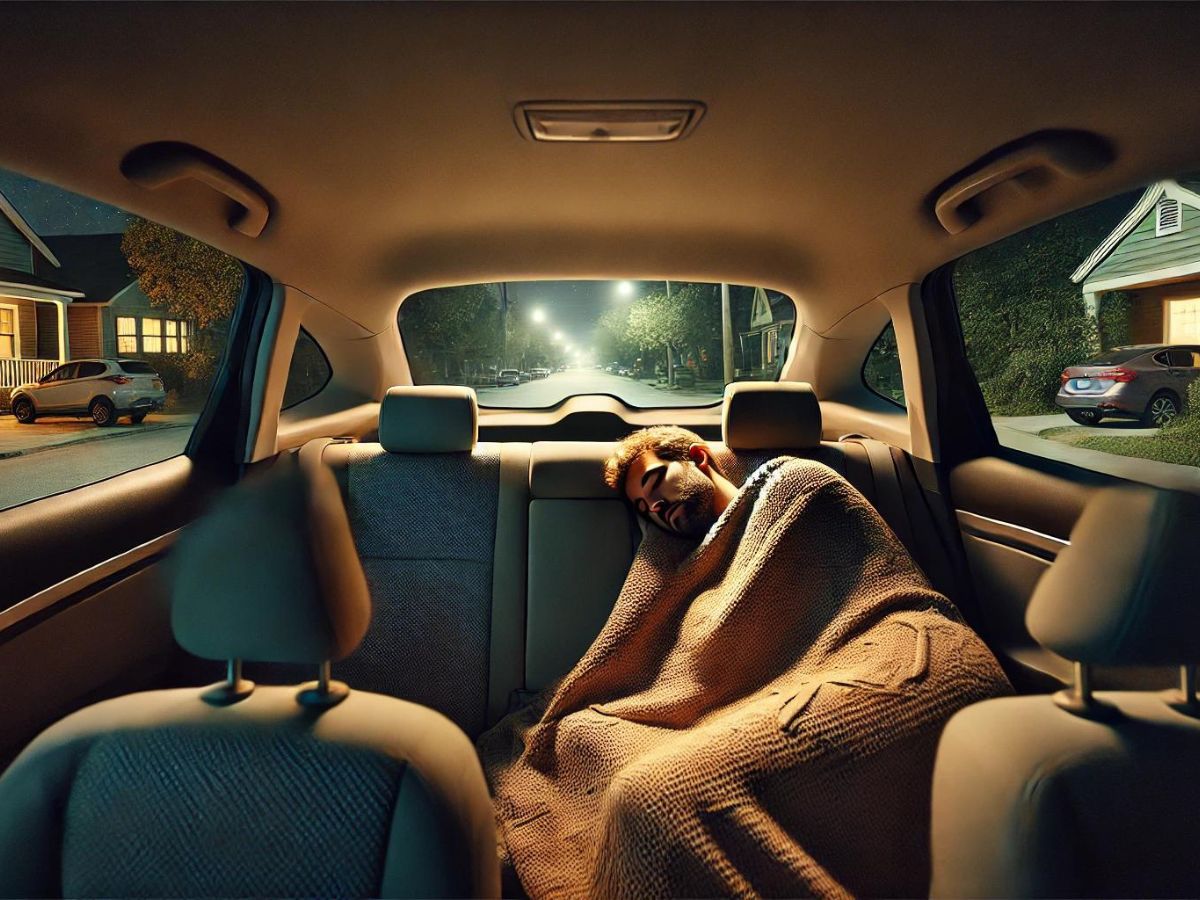Can You Understand the Risks of Sleeping in Your Running Car All Night?
You face severe risks sleeping in a running car all night. Carbon monoxide from the engine can cause headaches, dizziness, and even unconsciousness. Ventilation is essential to prevent this. Engine problems may occur, draining the battery and damaging components. Gasoline fumes pose toxicity dangers without proper ventilation. Overheating can lead to heat exhaustion. Fire hazards and theft risks also exist. Exhaustion affects cognitive function. Legal consequences may follow. Recognizing these risks is critical.
Carbon Monoxide Poisoning
One common risk associated with sleeping in your running car all night is the potential for carbon monoxide poisoning. Carbon monoxide is a colorless, odorless gas produced by the combustion of gasoline in your car’s engine. When you sleep in a running car with poor ventilation, carbon monoxide can build up to dangerous levels inside the vehicle. This can lead to symptoms such as headache, dizziness, weakness, nausea, confusion, and even loss of consciousness. In severe cases, carbon monoxide poisoning can be fatal.
To prevent carbon monoxide poisoning while sleeping in your car, it is vital to ensure proper ventilation. Keep a window cracked open to allow fresh air to circulate and prevent the buildup of carbon monoxide. If you start experiencing symptoms of carbon monoxide poisoning, such as headache or dizziness, it is essential to seek medical treatment immediately. Medical professionals can administer oxygen therapy to help remove carbon monoxide from your bloodstream and prevent further harm. Remember, adequate ventilation and awareness of symptoms are key in staying safe when sleeping in your running car.
Engine Malfunction
When you run your car all night, there is a risk of engine malfunction, which can lead to various issues. This includes potential battery drain, which may leave you stranded in the morning. Additionally, prolonged idling can put unnecessary strain on your engine components, potentially causing long-term damage.
Carbon Monoxide Poisoning
Carbon monoxide poisoning from engine malfunction poses a significant risk when sleeping in your running car all night. Symptoms of carbon monoxide poisoning include headache, dizziness, weakness, nausea, vomiting, chest pain, and confusion. Preventing this danger involves never sleeping in a running car, ensuring proper ventilation in garages, and installing a carbon monoxide detector in your vehicle.
If you suspect carbon monoxide poisoning, immediately move to fresh air and seek medical help. Treatment for poisoning involves administering oxygen to help remove carbon monoxide from the blood. Awareness of the risks associated with engine malfunction and carbon monoxide poisoning is essential for your safety and well-being. Always prioritize proper maintenance of your vehicle to prevent malfunctions that could lead to this dangerous situation.
Battery Drain Risks
To further understand the risks of sleeping in your running car all night, it is important to take into account the potential battery drain risks associated with engine malfunction. When leaving your car running for an extended period, the risk of draining the battery increases considerably. The continuous operation of the engine without driving the vehicle can lead to excessive battery usage, especially if the alternator is unable to recharge it properly.
Prevention tips to avoid battery drain include regular battery maintenance, such as checking for corrosion on the terminals, ensuring the battery is securely connected, and testing its voltage periodically. Additionally, limiting the time the engine runs while stationary can help prevent unnecessary battery drainage. If you plan to sleep in your car with the engine running for climate control or other purposes, consider investing in a portable jump starter as a precautionary measure in case of battery depletion. Proper battery care and monitoring are essential to prevent unexpected engine malfunctions due to battery drain risks when sleeping in your running car.
Gasoline Fumes
Breathing in gasoline fumes while sleeping in your running car can lead to toxic fume exposure, which can cause symptoms like headaches, dizziness, and nausea. Moreover, prolonged exposure to these fumes can result in carbon monoxide poisoning, a potentially life-threatening condition that interferes with oxygen delivery in your body. It is important to be aware of the health risks involved in inhaling gasoline fumes, as they can have serious consequences on your well-being.
Toxic Fume Exposure
Exposure to gasoline fumes while sleeping in your running car poses a significant health risk due to the toxic chemicals released into the enclosed space. Ventilation concerns are important in this scenario, as inadequate airflow can lead to a buildup of harmful fumes such as benzene, toluene, and xylene. Prolonged exposure to these substances can cause dizziness, headaches, nausea, and in severe cases, organ damage. To prevent these health effects, it is vital to prioritize safety precautions. To start with, make sure that there is proper ventilation by cracking open the windows slightly to allow fresh air to circulate. Additionally, avoid idling the engine for extended periods before sleeping to minimize fume accumulation. Moreover, consider sleeping outside the vehicle if possible to eliminate the risk entirely. By following these prevention tips and being mindful of the dangers associated with gasoline fumes, you can safeguard your health and well-being while sleeping in your car.
Carbon Monoxide Poisoning
Inhaling gasoline fumes while sleeping in a running car can result in dangerous levels of carbon monoxide poisoning. Carbon monoxide is a colorless, odorless gas produced by the incomplete combustion of carbon-containing fuels like gasoline. When inhaled, carbon monoxide binds to hemoglobin in the blood, reducing its ability to carry oxygen, leading to symptoms like headache, dizziness, confusion, and in severe cases, coma or death.
Long-term effects of carbon monoxide poisoning include neurological damage, cardiovascular issues, and respiratory problems. Even low levels of exposure over time can have detrimental health effects. Safety precautions to prevent carbon monoxide poisoning include never sleeping in a running vehicle, ensuring proper ventilation when operating a car in an enclosed space, and installing carbon monoxide detectors in living and sleeping areas. Immediate action should be taken if symptoms of carbon monoxide poisoning are experienced, such as moving to fresh air and seeking medical help promptly. Prioritizing safety measures can prevent tragic consequences associated with carbon monoxide exposure.
Health Risks Involved
When sleeping in a running car, the presence of gasoline fumes poses significant health risks that must not be underestimated. Gasoline fumes contain toxic chemicals such as benzene, toluene, and xylene, which can have detrimental effects on your health. Breathing in these fumes can lead to respiratory issues, including irritation of the airways, coughing, and shortness of breath. Prolonged exposure to gasoline fumes while sleeping can also impact your sleep quality, causing disruptions and potentially leading to fatigue and daytime drowsiness.
Furthermore, inhaling gasoline fumes can affect your mental health and cognitive function. Studies have shown that exposure to these fumes may result in symptoms such as headaches, dizziness, and confusion. These can impair your ability to think clearly, concentrate, and make decisions, affecting your overall cognitive performance.
To safeguard your health, it is essential to avoid sleeping in a running car to prevent exposure to gasoline fumes. Prioritize your well-being by choosing safer alternatives for rest to maintain both your physical and mental health.
Overheating
What factors contribute to the risk of overheating when sleeping in your running car all night? Heat exhaustion risks and dehydration concerns are significant dangers when sleeping in a running car. The confined space can trap heat, leading to a rise in internal temperatures, potentially causing heat exhaustion. Without proper ventilation, the risk of overheating increases, especially during warm weather conditions.
To mitigate the risk of overheating, consider installing window tinting. Tinted windows can help reduce the amount of heat entering the car, creating a cooler environment inside. Additionally, utilizing ventilation options such as cracking windows or using a sunroof can aid in promoting airflow and preventing overheating. It is important to make sure that there is a constant flow of fresh air circulating within the vehicle to maintain a safe and comfortable temperature. By addressing these factors, you can minimize the risk of overheating and create a safer environment for sleeping in your running car.
Fire Hazard
Sleeping in a running car poses a significant fire hazard due to various factors that can lead to ignition and potential danger. Important ventilation is vital when sleeping in a running car to prevent the buildup of toxic gases like carbon monoxide, which can pose a fire risk. Make sure that the exhaust pipe is not blocked and windows are slightly open to allow for fresh air circulation and reduce the likelihood of a fire starting.
To mitigate the fire hazard, it is essential to take safety precautions such as having a fire extinguisher readily accessible in the car. Regularly check the condition of the fire extinguisher and ensure that you know how to operate it effectively in case of an emergency. Additionally, developing an emergency plan that includes steps to follow in the event of a fire can help you act swiftly and decisively to protect yourself and others. By staying prepared and implementing safety measures, you can significantly reduce the risk of a fire while sleeping in a running car.
Theft and Safety Concerns
To minimize the risk of theft and enhance overall safety when staying in your running car overnight, it is important to implement security measures and remain vigilant at all times. Privacy concerns and security risks are heightened when sleeping in a running car, making theft prevention and safety precautions vital.
Ensure all doors are locked, windows are closed, and the vehicle is parked in a well-lit area to deter potential intruders. Consider installing motion-sensor lights near the car or using a steering wheel lock for added security. Keep valuables out of sight or store them in the trunk before settling in for the night. Avoid leaving spare keys inside the car, as this increases the risk of theft.
Maintain situational awareness throughout the night and trust your instincts; if something feels off, it’s better to relocate to a safer location. By taking proactive measures and staying alert, you can greatly reduce the chances of falling victim to theft or compromising your safety while sleeping in your running car.
Exhaustion and Fatigue
Essential, thus
Excessive exhaustion and fatigue can greatly impair your cognitive function and decision-making abilities, posing serious risks when sleeping in a running car. Lack of quality sleep not only affects your mental health but also hampers your long-term productivity. When you are sleep-deprived and choose to rest in a running vehicle, the engine noise and vibrations might disrupt your sleep quality, leading to fragmented rest. This fragmented sleep can result in decreased alertness and concentration the next day, potentially jeopardizing your ability to drive safely or make sound judgments.
Moreover, chronic sleep deprivation can have lasting effects on your mental and physical well-being, impacting your productivity levels over time. It can lead to decreased cognitive performance, memory issues, and mood disturbances, all of which can hinder your daily functioning. Thus, it is essential to prioritize adequate rest in a suitable environment to safeguard your mental health, enhance your sleep quality, and optimize your long-term productivity.
Legal Implications
Chronic sleep deprivation from sleeping in a running car may result in legal consequences due to impaired cognitive function and decision-making abilities. The risk of falling asleep at the wheel or making poor judgments increases, potentially leading to accidents. In some jurisdictions, if an accident occurs due to drowsy driving from sleeping in a running car, criminal liability could be pursued, especially if it results in injury or death.
Moreover, insurance coverage could be impacted. If an incident happens while sleeping in a running car, insurance companies may investigate whether negligence was a factor. Engaging in risky behavior like sleeping in a running car could be deemed critical, potentially affecting coverage. It is essential to understand that legal repercussions extend beyond personal safety; they could have lasting financial and criminal ramifications. Prioritizing adequate rest in a safe environment is not only essential for physical well-being but also for avoiding legal troubles and insurance complications.
Health Risks
Sleeping in a running car all night poses significant health risks due to exposure to carbon monoxide emissions. Carbon monoxide is a colorless, odorless gas produced by the incomplete combustion of carbon-containing fuels such as gasoline. When you sleep in a car with the engine running, especially in an enclosed space like a garage, the accumulation of carbon monoxide can lead to carbon monoxide poisoning. This can result in symptoms such as headache, dizziness, weakness, nausea, confusion, and even death in severe cases.
Furthermore, the quality of your sleep is compromised when exposed to carbon monoxide, leading to fatigue and cognitive impairment the following day. Ventilation is essential when sleeping in a car to allow fresh air to circulate and prevent the buildup of harmful gases. Proper ventilation can help reduce the concentration of carbon monoxide and improve sleep quality by ensuring a safe and breathable environment. Prioritizing ventilation is vital to mitigate the health risks associated with sleeping in a running car.
Risks and Precautions of Sleeping in Your Running Car All Night
In summary, sleeping in your running car all night poses a multitude of risks, including carbon monoxide poisoning, engine malfunction, gasoline fumes, overheating, fire hazard, theft and safety concerns, exhaustion, fatigue, legal implications, and various health risks. It is vital to contemplate these dangers and take necessary precautions to guarantee your safety and well-being while sleeping in a car.







